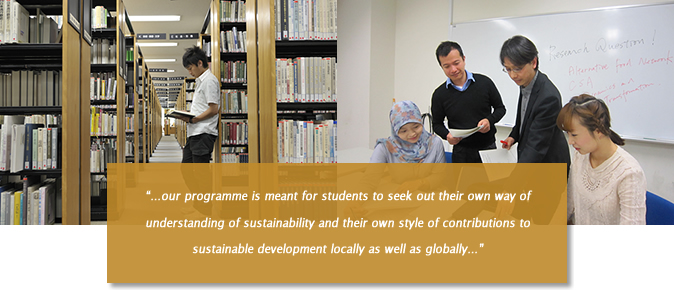Programme Outline


There are a number of challenges that East Asia must address if it is to maintain its economic role as one of the leaders of the world. These include challenges relating to environmental (in)stability and climate change, increasing demand for natural resources, food and energy, uneven development between agricultural and industrial sectors, widening income disparities and aging populations, as well as the accountability of government and business sectors. It is required to nurture students’ skill and knowledge to meet these challenges and complexities. Pragmatic approaches in particular are expected to provide new insightful solutions in problem solving. Such approaches, to a greater extent, can be translated into multidisciplinary methodologies that involve different fields of academic disciplines in the social sciences.
Multidisciplinary Perspectives
As a degree programme, our international programme for East Asia Sustainable Economic Development studies is focused on “economics”. However, students are encouraged to adopt disciplinary diversity, study diverse theories, approaches and methodologies, and enhance their understanding and critical sense of reality of economic, social, political, cultural, and ecological systems from multidimensional and multidisciplinary perspectives. This is precisely because sustainable development, as broadly conceived, is only possible through understanding it as “the product of many stories, worldviews, values, actions and perspectives which, to be fully appreciated, require a readiness to listen to others, respect differences, suspend established opinions and see with others’ eyes while allowing other voices to resonate and be heard” (John Blewitt, Understanding Sustainable Development, 3rd edition, Routledge, 2018, p. 2).
International Setting
Our programme is designed to provide students with both advanced academic knowledge and practical skills also in an international setting. In addition to lecture and seminar classes within and beyond the programme, students will be encouraged to participate in a variety of international workshops and exchange activities jointly organised with our partner universities in Asia and Europe. Students will also benefit from many opportunities to conduct field research at diverse sites, such as governmental and non-governmental organisations, large manufacturing plants and small factories, cutting-edge businesses and rural farming communities in Japan as well as throughout East Asia, so that they can develop a critical sense of reality. These are all needed to contribute to sustainable development in East Asia and the world as academic researchers, government officials, or social entrepreneurs.
Expected Specialisations
Our admission and curriculum policies are oriented towards “sustainability” studies, mainly of East Asian economies (but not exclusively, as far as comparative perspectives are considered), and place a specific focus on the environmental, social, and governance aspects of development policy, industry policy, and business management. We emphasise that this programme is not an English-version of the GSE’s graduate programme—“Academic Research Training Path (R programme)” and “Professional Career Training Path (P programme)” — taught mainly in Japanese.
Student Backgrounds and Future Career Paths
Most of our students are graduates of top-level universities of each country and region. They have diverse academic backgrounds ranging from economics, business management and political economy to political science, law, sociology, and cultural studies. Some of them also have rich working experiences in the private sector, the public sector, as well as the civil society sector. We guide students towards diverse career paths, including economist, social entrepreneur, international civil servants contributing to international sustainable development, and academic researcher with an international standard of competence, but each student’s career path eventually depends on their preferences and capability. Our mission is to help students accomplish their graduate studies and equip them with knowledge, skills, and perspectives needed to contribute to making this society better and sustainable.